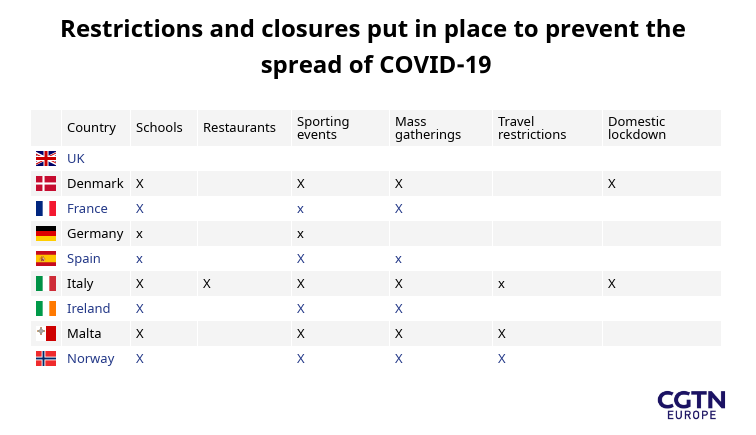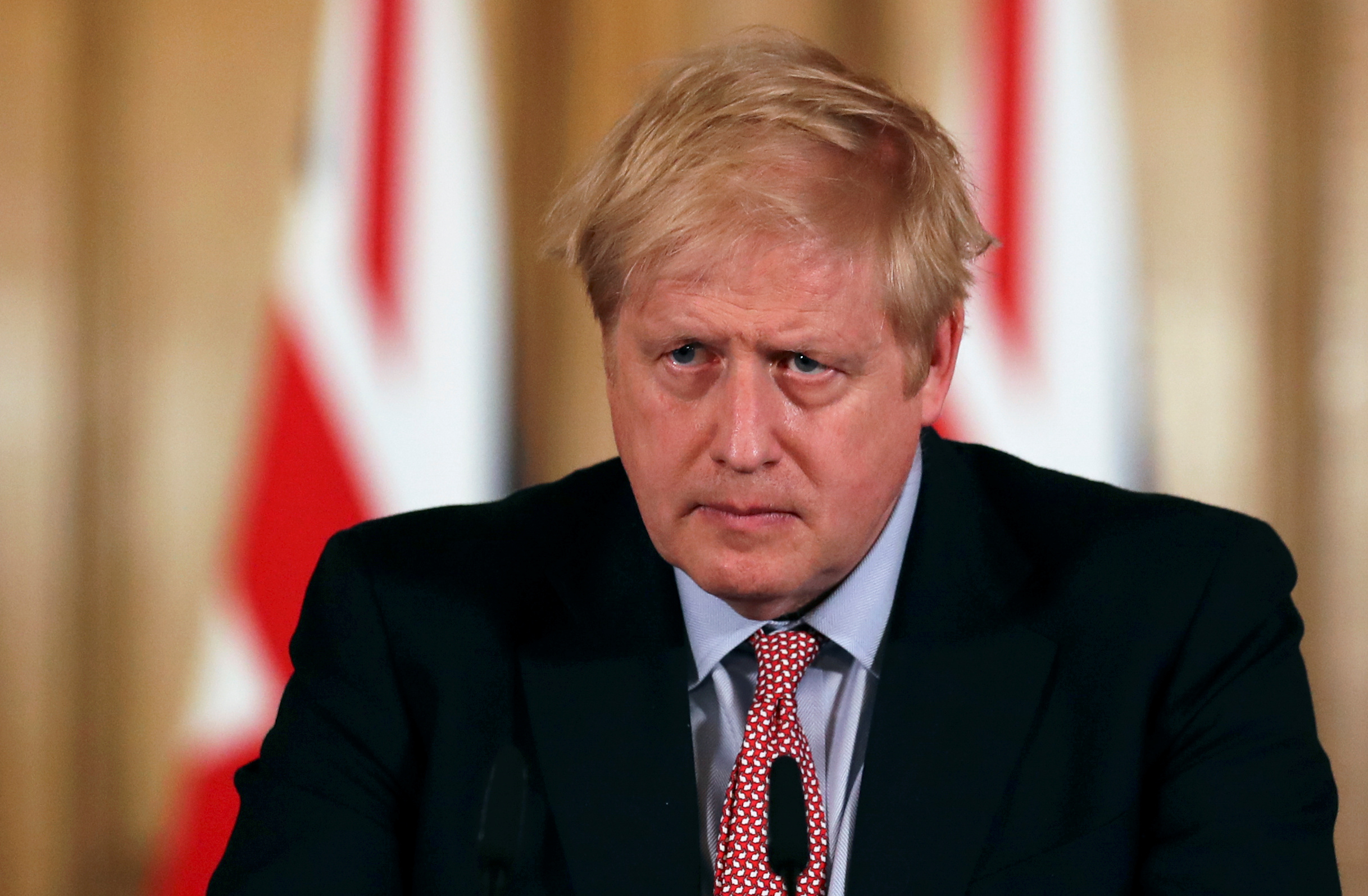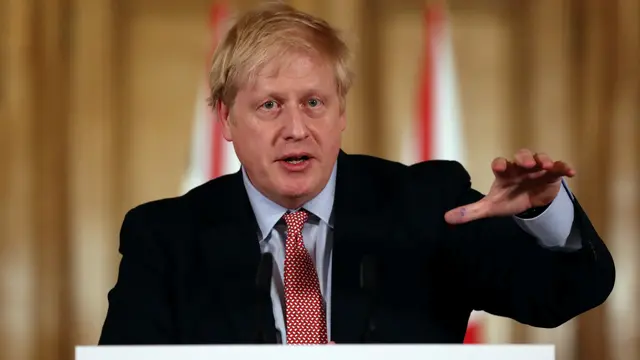01:56

COVID-19 in Europe
Since the novel coronavirus first emerged in late December 2019, more than 131,479 cases have been recorded in 116 countries and territories.
The worst-affected country is China, with 80,793 cases and 3,169 deaths on its mainland. Italy follows with 15,113 cases and 1,016 deaths. Iran has 10,075 cases and 429 deaths and Spain currently has 2,968 cases and 84 deaths.
As COVID-19 spreads across Europe and the number of cases rise rapidly, European countries are taking different approaches in their responses to the pandemic.
The British government said between 5,000 and 10,000 people in the UK could be infected, while the official rate is 590. But the measures the UK is taking are quite different from those in other European countries, so what exactly is each country doing across Europe?

A chart showing the restrictions and closures that have been put in place in the UK and Europe. /CGTN
The UK
There are several differences between the UK's response and other countries in Europe.
Ireland, Romania and Italy have closed schools, but the UK is not doing this on the grounds that children are one of the least vulnerable groups.
Football matches are being played without crowds in Italy, Spain and France – but the UK government is not imposing such restrictions. The health authorities in Britain say such measures have less effect than other less disruptive actions. Games in England's Premier League, EFL, FA Women's Superior League and Women's Championship are postponed, as a result of an independent decision made by England's Premier League.
Britain is on a trajectory of cases "about four weeks" behind Italy and other badly hit countries in Europe, according to the government's chief scientific adviser Patrick Vallance.
UK Prime Minister Boris Johnson said on Thursday that the outbreak is "the worst public health crisis for a generation." Saying at a news conference in Downing Street that "Many more families are going lose loved ones before their time."
Measures in the UK that have been enforced include recommending anyone with COVID-19 symptoms to stay at home for at least seven days as well as only testing people in hospital. Johnson added that schools will be requested to cancel foreign trips and elderly people and those in poor health should not go on cruise ships.
Johnson rejected claims on Thursday that Britain was not doing enough to stop the spread of coronavirus, as tough measures were implemented in other countries to tackle the pandemic.
Johnson has faced calls to shut schools and ban sporting events with large crowds, to try to limit the spread of COVID-19, which has so far infected 590 people in Britain and killed 10.
Pressure escalated for greater action after neighboring Ireland, which has had 43 cases and one death, announced that schools, galleries and museums would shut from Friday until March 29. The Irish Prime Minister, Leo Varadkar, also said that mass gatherings would be canceled.
The U.S. also introduced a travel ban from mainland Europe, as European countries, particularly Italy, imposed tough restrictions on movement and sporting events were canceled. The UK has not implemented automatic checks because it says these measures are only effective if simultaneously implemented by all countries.
Other countries have put strict quarantine measures in place, the UK is not implementing automatic checks because it says these measures are only effective if implemented by all countries simultaneously and they say it is too late to stop the virus spreading to the sports sector.
Johnson stands firm on his approach. Even as the FTSE 100 index fell sharply on coronavirus fears and the World Health Organization said some countries were not handling the pandemic with sufficient urgency.
The prime minister instead insisted he would be guided by his scientific advisers, even after accusations of "complacency" over the government response.
Richard Horton, editor of
The Lancet
medical journal, said that more aggressive "social distancing" measures should have been introduced earlier.
Johnson said to a news conference that the government was "considering the question of banning major public events such as sporting fixtures" as part of its contingency plans.
Other restrictions are potentially going to be introduced at a later date, including telling anyone living with someone who was taken ill to self-isolate for seven days, said Johnson.
But scientists recently advised that there was a greater risk of transmission in smaller venues than among large crowds.
Johnson also said that school closures "could do more harm than good," stating that the new core measures that anyone with symptoms should stay at home for at least seven days were currently the "most powerful defensive lines" to slow down the spread of the virus.
Speaking to reporters, he said: "We think it's very important to maintain public trust and confidence in what we are doing, throughout this challenging time, always to be guided by the best possible scientific advice."
London is depending on stretching the peak of the outbreak into the summer months, to alleviate pressures on the state-run National Health Service (NHS) and emergency services, which are already stretched by winter flu outbreaks.
Johnson said this would mean, "more beds and more time for medical research... So society is better able to cope."
"This would help us delay and flatten the peaks... because that is the way to minimize the suffering and minimize the impact of the disease," he said.
Developing "herd immunity" amongst the population is another strategy, which Patrick Vallance, the government's chief adviser, said would happen if the virus is allowed to spread slowly. He added that 60% of the population need to be infected in order to develop such immunity.
The UK government is also aware of what it describes as public "fatigue" of imposing tougher restrictions before they are most desperately needed.
"This is going to be a long haul. It is very important we do not start things in advance of need," Johnson said.
This approach is not without criticism.
The Lancet
's Horton said the government is "playing roulette with the public." He said that more aggressive "social distancing and closure policies" should have been introduced sooner.
On Wednesday, the government unveiled a $38 billion package to aid those affected by the crisis, amid calculations and predictions that as many at 10,000 people could be infected.
On Thursday, several British universities said they were canceling face-to-face lessons, while the Electoral Commission recommended that local elections scheduled for 7 May be postponed.

Britain's Prime Minister Boris Johnson said: 'Many more families are going lose loved ones before their time.' Which has received strong criticism on social media. /Simon Dawson/Pool/AFP
Some of the following measures have been put in place in countries across Europe in order to control the spread of COVID-19.
France
French President Emmanuel Macron has announced that schools, universities and creches in France will close from next week "until further notice."
Macron has also urged people aged 70 and over to stay at home.
Slovakia
Slovakia has banned entry to all foreigners, except Polish citizens.
Czechia
The country has banned entry to people from 15 countries.
Germany
The German government has announced that it is unleashing its biggest economic aid package in the country's post-war history. Companies will be offered "unlimited" credit to keep them afloat during the coronavirus crisis.
German chancellor, Angela Merkel, said the measures "are unprecedented in the history of the German government" and said that Berlin would do "whatever is necessary" to tackle the fallout from the pandemic.
The country has also bolstered controls at its border with France.
Italy
All shops considered non-essential have been closed, cultural events are cancelled and 60 million people are instructed to stay inside with the country in lockdown. People can leave the house to go to work, for health reasons or to buy food.
Rome's Ciampino airport will close from Friday, while activity at Fiumicino, which handles international flights, will be reduced from 17 March.
Spain
Spain's government is to declare a state of alert over the rapid spread of coronavirus, according to Prime Minister Pedro Sanchez.
"There will be a cabinet meeting tomorrow to declare a state of alert across the country for a period of 15 days," said Sanchez.
Spain has put four towns in the northeastern Catalonia region under quarantine.
All members of the Spanish government will be tested, following equality minister Irene Montero testing positive.
The Spanish football league has been suspended for at least two weeks, and the Real Madrid football and basketball teams are being placed in quarantine.
Ireland
Ireland has closed schools, universities and cultural institutions from Friday until 29 March.
Bulgaria
The country's health ministry ordered on Friday the immediate shutting of all non-food stores, restaurants and schools across the country until 29 March to fight the spread of COVID-19.
The government implemented a "state of emergency" on Friday.
Denmark
Denmark had advised its citizens against all non-essential travel to all destinations.
The country's foreign ministry said: "You should not travel abroad unless it is absolutely necessary."
Switzerland
Schools are closing in order to stop the virus sweeping across the country and the government has also said it would provide billions in aid to hard-hit businesses.
Slovenia
Health vetting measures have been set up at the border with Italy.
 简体中文
简体中文




